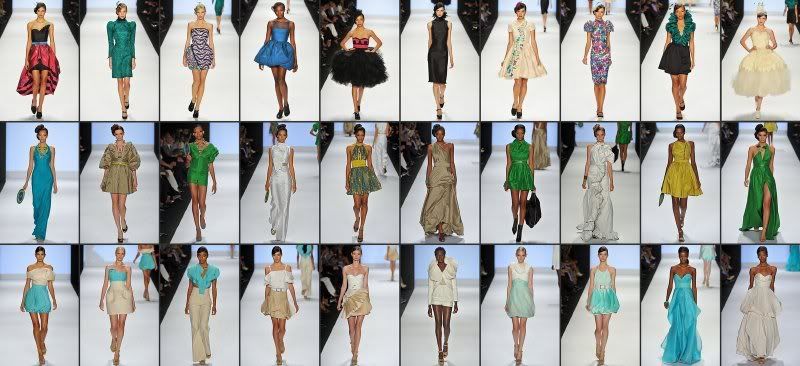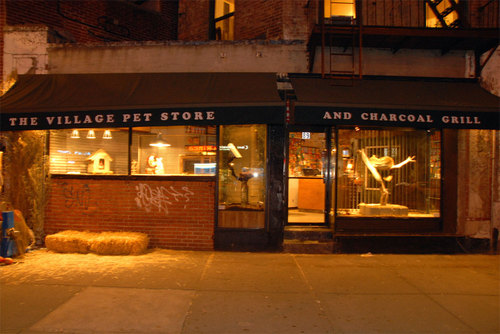
Friday, October 31, 2008
Justin Townes Earle - The Good Life

Saturday, October 25, 2008
Toward What End?
A recent encounter triggered this post:
I visited Northwestern last week and, while at church, I met a tall, awkward, and mostly cheerful Freshman guy. As usual, we went through the where are you from, how do you like NU, etc. Then I asked “What do you study?” and, like 900 others at Northwestern, he replied “Economics.” Hiding my frustration I asked, “Why?’ To which he responded, “I want to go into Finance.” Not satisfied with his response, I probed further: “Why?” His response was what I had both dreaded and expected, “Well, you can make a lot of money.” To his credit, he was honest and I don’t fault him for his relatively unimaginative and deep desire for post-graduation marketability.
Don’t worry, I am not going to rant about how confused he was or about the downward spiral of American society due to rampant materialism. I think this conversation brought up a different, bigger question. The point is that the young man in this story did extremely well at what would probably be considered a near “model high school” in our system. My question is, if this is a model student from a model school, toward what end are we attempting to develop underperforming schools? Are we sure that we have our metrics right for determining the success of a school and a student?
It seems that we hold wealthy and “high-performing” suburban schools as an ideal toward which we ought to be developing the underperforming urban and rural schools in our country. So what if every school in the country had average ACT scores of 26 with 80% of their students going to college? Would students necessarily have a more coherent worldview, sense of purpose, or desire for justice? In my mind, if a student can excel in our educational system, get accepted to a top college, and have such a narrow a vision about the possibilities of their life, something is broken.
When it comes to international development, the most cited statistic is that x number of people live on less than $2 dollars per day. Why is it money that we are so concerned with? Haven’t we learned that money doesn’t necessarily lead to a sense of fullness or happiness? I think the only appropriate goal of those who wish to develop poor communities is “Do people have the capacity to live lives that they have reason to value?” The imposition of our paradigm on the world represents a violent subversion of their identity, it puts them into financial, not human, categories.
Underlying all of this is a general frustration about how we think about helping poor communities. We assume that the institutions of the wealthy are the goal and we “develop” accordingly. What is that we are desiring for poor communities? That they too can become entrenched in a cycle of acquisition and maintenance? Maybe there is a different paradigm that we should all be working toward, wealthy and underprivileged communities alike. What would your alternative education or international development paradigm look like? What are the proper metrics of success?
Wednesday, October 22, 2008
How Responsible Are We?
-Bill Clinton
Since the onset of the Second Congolese War in 1998, an estimated 5.4 million people have died as the result of violence in the Democratic Republic of Congo. The US Government did essentially nothing to address the situation. This raises the question:
-As a state, are we morally required to act in the face of massive deprivation of human livelihood within foreign countries?
It is generally agreed upon that international military intervention is permissible and even required when humanitarian crises are so extreme as “to shock the conscience of mankind,” including genocide, massacre, ethnic cleansing, etc. When states are unable or unwilling to protect their citizens from large-scale loss of basic rights, such as the right to life, then the international community must collectively intervene on the basis of numerous treaties, common humanity, and a commitment to human rights. However, this does not solve the problem. It seems obvious that someone should do something, but who and in what way?
Nobody would expect the Salvadoran Government to protect Congolese citizens from rebel forces, but why not? El Salvador is utterly incapable of leading such an intervention. The actors that are most capable (given their military and economic strength as well as their strategic advantage) assume the moral imperative to act once the general need to act is recognized among the international community. Consider the following situation:
A man begins to choke in a restaurant and falls to the ground. The entire restaurant turns to look and see that he is having difficulty breathing, it appears he will die if nothing is done. If there were an emergency physician in the restaurant, would he not have the most responsibility to help the suffering man, given his capability as a trained doctor? If the doctor sees too many risks (lawsuit, personal health, etc.) involved and refuses to help, isn’t the duty to act then passed on to the next most capable individual, perhaps a nurse? Everyone in the restaurant should help the best they can, maybe by calling 911 or helping with crowd control, but it is the most capable individual(s), the physician, who ought to orchestrate the effort.
I would argue that the general principle here of “capability-based obligation” in crisis situations applies in international society as well.
The most powerful nations and organizations of the world have a duty to act because of their capabilities. There is no better or more appropriate body than the United Nations Security Council to authorize military intervention for humanitarian purposes. However, if the Council is unwilling to act in a timely and effective manner to stop genocide or ethnic cleansing, the burden of protection is transferred to the next most capable power, which is arguably the United States. Of course, other members of the international community are also required to act in whatever way feasible; it would be unfair to expect the hegemon to be the sole provider of relief in every humanitarian crisis. However, the hegemon (similar to the doctor) has the duty to lead the collective effort. We, the United States, had (have) the capability and thus the duty to orchestrate a multilateral intervention in the DRC to prevent mass crimes against humanity.
The United States has continually shirked responsibility to protect from large-scale loss of basic human rights abroad. To be blunt, we have a racist foreign policy; no country in Western Europe would undergo that sort of damage without a strong response from our government. Until the American people internalize responsibility for their global brothers and sisters and demand that our government affirm the humanity of all people, we will continue to have an overly narrow and unfortunate articulation of our national interest.
Joe Biden mentioned the DRC during his VP debate; I hope he was for real. What do you think? Do we have a duty to act in these situations? If so, will an Obama administration be less likely to shirk?
Monday, October 20, 2008
Dave: Good Guy or Evil Socialist?
I'm going to borrow a phrase my cowriter used in his last post: "As a caveat, this is an exploration more than an argument."
In the last week, I have been reading Dave's posts in conjunction with a myriad of essays on political theory (shudder), and more specifically, the primary political ideologies: liberalism, conservatism, and socialism. It is essential to read this post knowing that I am an infant when it comes to these topics, and therefore, it's likely that I'm quite a bit off. With this context in mind, I would like to cautiously respond to Dave's last two posts.
In "Achieving Community," Dave stated:
"Our ability to experience social justice as individuals depends on our belonging to a community, as it is only in community that our basic human needs are met."
Forthright declaration that human needs can only be met via the community is the foundation of Socialist ideology. With this assumed, Socialists prioritize the community instead of the individual. Thus the state equates the importance of individuals; people are but "cogs of a machine" working for the ultimate success of the entire community.
In stark contrast, Liberalism, which comes from the Latin "liber" meaning "free," is based upon the liberty and rights of the individual: the freedom to speak, write, assemble, earn, trade, and own, all in the pursuit of individual desires, needs, and success. The state must respect its citizens as people, not treating them as mere "cogs." State power must be both: (1) limited as much as possible wherever it infringes upon an individual's freedoms, and (2) utilized to protect its citizens from such infringements.
In "To and Fro: The Failure of Libertarianism," Dave stated:
"Libertarianism fails because it is premised on...the centrality of self-interest."
In actuality, self-interest is the centrality of the aforementioned Liberalism, of which Libertarianism is but one of many schools. And by no means has Liberalism "failed." Quite the opposite, Liberalism is the foundation of the American political discourse.
It should be noted that Socialism is not rooted in Christian thought. Socialists do not view cooperation and redistribution of wealth through a lens of "good" or "holy" the way Jesus Christ might have (remember: "It's easier for a camel to enter the eye of a needle than for a rich man to enter the Kingdom of Heaven"), but through one of social justice and communal empowerment. Dave's realization regarding the selfishness of Liberalism was reached via the writings of a pastor, Dr. Martin Luther King Jr., and was therefore founded on the Christian ideals of love ("agape") and faith.
I'd like to make it perfectly clear that I do not disagree with Dave. Instead, I'm attempting to explore the notion that Christian religion (or perhaps "love") and American politics--the latter of which, Dave never explicitly mentions in "Achieving Community"--may very well be inherently opposed to one another. Hence the absolutely essential need for separation of Church and State.
So: What's the point?
I suppose I would argue that self-interest and individual competition, as encouraged by Liberalism, are not cause for worry. If anything, these tenants are precisely what make modern, Western governance and economy work well. As contradictory as it may seem, strides towards a "world community" should be taken only insofar as these foundations are--at all costs--protected.
And since I stated from the outset that this post wasn't an argument, but an exploration, I'd like to ask the brave souls still reading: How?
Saturday, October 18, 2008
Project Runway Season 5 Wrap-Up


Friday, October 17, 2008
Achieving Community
As a caveat, this is an exploration more than an argument.
I have had a deep desire for some time to fully understand and experience authentic community. Living in the information age forces us to think even harder about community because it no longer depends on proximity. Last night, I read two things that challenged me to think more about the importance of community:
1) In his book, Faith of Other Men, scholar W. Cantwell Smith writes, “Surely the fundamental human problem of our time is to transform our new world society into a world community.”
2) Martin Luther King Jr. writes, “Agape (Greek: unconditional love) is a willingness to go to any length to restore community.”
Turning society into community, having the courage to restore community, where do these provocative ideas leave us? I want to explore what community is, where it comes from, and why it matters. Realizing that defining community is a potentially limitless task, I would like to err on the side of conciseness and argue that community is consensual interdependence formed on the basis of:
1) Interaction, the degree to which we engage one another
2) Common vision/ purpose
3) Shared narrative
4) Collective values
Which, when combined lead to a feeling of community, a sense of:
1) Belonging
2) Influence and voice
3) Mutual trust
4) Collective identity
These factors, in turn, create mutual loyalty and collective responsibility for those within a community. How then do we move from a world society into a world community? Why does love require us to restore communities?
Our ability to experience social justice as individuals depends on our belonging to a community, as it is only in community that our basic human needs are met. The disenfranchised of the world are those who have not been fully included within a real community; they have not reaped the benefits of voice, belonging, identity, trust, and mutual loyalty. Furthermore, perhaps a community’s experience of justice depends upon it being part of a larger Community that ensures its vitality. In terms of the disenfranchised of the world, maybe they are a part of a wholly disenfranchised community (think of an oppressed people group or those in an IDP camp). The question then becomes, how do we empower communities do ensure the vitality of their own members and how do we build bridges between communities to ensure the vitality of communities?
Responsibility then is three-fold in community, there is responsibility of one-to-the-other, of the community to the individual, and the Community to the community. Only when individuals and communities internalize these responsibilities can we move to a more inclusive world community, founded on agape.
Wednesday, October 15, 2008
Ryan Lizza on Joe Biden
Having established his intimate knowledge of the man, Biden then shook his head sadly and added, “But ladies and gentlemen, I know John well. John does not disagree with George Bush on any single substantive issue.”
Biden used that line of attack during the debate with Palin, on October 2nd, which was seen by seventy-three million viewers—more than watched either of the Obama-McCain debates. He continued to link McCain to George W. Bush, while praising Obama and promoting his agenda—the consummate Vice-Presidential candidate. Yet, unsurprisingly, Palin has dominated the coverage. The press section of Biden’s campaign plane is dominated by young television reporters who don’t get much attention from their producers in New York and Washington. One evening when I was there, several correspondents played Guitar Hero while a crew from the television show “Extra” threw darts at a magnetic board.
On some days, only a single print reporter is covering Biden, and weekly studies of the news by the Pew Research Center’s Project for Excellence in Journalism note that Biden was the subject of between two and six per cent of all stories each week in September. (Palin was the focus of between fifteen and sixty per cent of a week’s worth of news in that same period.) Pew has noted that Biden is “the virtually forgotten candidate,” someone who “has consistently been an afterthought in the coverage.”
Sunday, October 12, 2008
To and Fro: The Failure of Libertarianism
• Individual liberty is the primary organizing principle of life and politics
• Government is always inefficient and intrusive
• We must decentralize government and deregulate markets
• Markets work better than bureaucracies
• Socialism is inherently evil
• Individuals always act in their best interest
Being a Libertarian allowed me to be different, independent, and maintain an aura of intellectualism. However, I always felt I was trying to support an ideology instead of honestly pursue a coherent political framework. Over the course of a three-year libertarian journey, I slowly (and humbly) came to the conclusion that the central theses of the Libertarian project diverged from my worldview, and my story, at the very beginning.
In my private life, I espoused a philosophy informed by faith and centered on love, service, and responsibility to the other. However, my politics were centered on the primacy of self-interest, markets, and individualism. This dissonance between my personal convictions and my politics was not only unrealistic, but unsustainable. At the bottom of the libertarian project I found an unimaginative, selfish, and empty political worldview.
Libertarianism fails because it is premised on 1) a misguided and wholehearted belief in markets and 2) the centrality of self-interest. On markets, Senator Obama once commented that conservatives have an unhealthy “market fetish,” I agree. Markets are not particularly good at empowering the disenfranchised, equalizing opportunity, protecting the earth, or fairly distributing resources. Markets have no moral compass; they are nothing more than amoral systems of exchange. While markets are great at aggregating information and facilitating the flow of capital, I fail to see how they can form the basis of a politics that aims toward social inclusion, cohesion, and justice.
Second, the libertarian project is based on an ardent individualism and explicit praise of selfishness. Libertarians place autonomy of the self at the center of their philosophy; fairness depends on how free the self is to pursue his or her own self-interest. The libertarian paradigm fundamentally puts the freedom of the ego prior to justice and fairness. All great religions and moral perspectives are founded on an ethic of compassion, of selfless love and service to others. Why then would we develop a political system (libertarianism) that puts the individual before the whole, the self before the other, that sees us as only responsible to pursuing our own interests? The libertarian agenda is void of serious moral consideration or substance; it is selfishness praised.
Libertarianism is an empty, and potentially dangerous, ideology that manages to thrive because it:
1) Convinces people that their selfishness is actually a good thing
2) Has the backing of well-accomplished intellectuals (mostly economists)
3) Appeals to principles of reason
4) Offers a safe alternative for conservatives that don’t like being called Republican
In short, I am thankful for my journey to and from libertarianism; I worry for those who never make it back.
Update on Yesterday's McCain Post
Saturday, October 11, 2008
Would the Real John McCain Please Stand Up?
"This goes against everything we think we know about John McCain, that he likes to surround himself with people that he's comfortable with, that are loyal to him. And all of a sudden, this is a political calculation, and it's gimmicky, and the gimmick could wear out."

- McCain has traditionally opposed negative "attack" ads, but in a last ditch effort, has decided to use them against Obama. These ads, coupled with Governor Palin's relentless efforts to draw a connection between Obama and "terrorist" William Ayers, have led to widespread and intentional misinformation. Horrifically, McCain's inadequate attempts to correct this situation may actually endanger our next President.
- McCain has resurrected what is essentially Bush's campaign team, the same group that smeared him and his family in 2000. At the helm is Steve Schmidt, a former protege of Karl Rove. Remember Palin's rousing acceptance speech at the Republican National Convention? Matthew Scully, a former Bush speech writer, wrote it.
- In another attempt to appease the conservative base, McCain has changed positions on the Bush tax cuts & Arctic National Wildlife Refuge drilling, two proposals which he ardently opposed eight years ago. At the time, the only other Republican Senator to vote with him, Lincoln Chafee, told Rolling Stone, "Sadly, sadly, sadly--McCain has flip-flopped...McCain is putting himself first."
- In perhaps their most despicable move yet, the McCain campaign will now broaden its attack ads to include Michelle Obama. The connection is decades old and flimsy at best, and McCain has repeatedly deemed spouses off limits, but it appears as though his managers have taken the reigns.
Thursday, October 9, 2008
Banksy's Newest "Pet Project"

Sunday, October 5, 2008
Blending Value and the Unity of Human Life
First I explain two important ideas, then I discuss why these ideas matter in tandem-
1) Blended Value
Generally speaking, businesses operate on a single bottom-line (profit generation) which is a paradigm that ignores the environmental and social impact of their actions. The creation of economic wealth and long-term financial value are widely understood as the purposes of business. However, thinking about value in this way is not only incomplete; it is incredibly dangerous to human livelihood. We can see the outcome of this misconception of value in that some corporations have record years and huge performance bonuses despite their widespread use of sweatshops/child labor, exploitation of marginalized communities, degradation of the environment, and abuse of human rights around the world.
Jed Emerson, a prominent figure in the social entrepreneurship space, has developed and advanced the idea of blended value. Emerson argues that all organizations, whether for-profit or nonprofit, create value that consists of economic, social and environmental value components. Thus, value should be conceived as fundamentally indivisible and measured utilizing a triple-bottom line approach that accounts for economic, social, and environmental impact. In this framework, organizations would have record years and huge bonus payouts when they protect the earth, promote social equity, facilitate economic empowerment, and make a profit. Emerson’s blended value is a more whole way of thinking about how organizations should engage our world.
2) Unity of Human Life
I want to briefly explore some thoughts of Alisdair MacIntyre, one of the most influential thinkers of our time, on the “unity of a human life.” MacIntyre asserts that we live in a world where our lives are wrongfully partitioned into easily digestible segments and categories, each with its own norms and modes of behavior. Understanding life in this way, there is a clear separation of work and life (work/life balance), public and private, childhood and old age, school and the real world, etc. In this fragmented system, each discrete realm is torn away from the rest of human life. MacIntyre argues that in order for our lives to be intelligible and for us to answer basic questions about how we ought to live, we must instead think about our lives as unitary and whole. We are not actors in discrete worlds, but co-authors of whole narratives.
MacIntyre goes on to argue that virtue should not be dependant on the ways we segment our lives. Instead, virtues infuse all aspects of our lives. For example, it is the same virtue of courage that is exhibited by a person’s courage as a parent, activist, friend, lover, believer, soldier, etc. However, in order for this unity of virtue to be lived out, we must also believe in the unity of life. MacIntyre writes, “I can only answer the question “What am I to do?” If I have first answered the question of what Story or stories do I find myself a part?” Our lives are whole narratives in which we live out unsegmented virtue.
3) Why might these ideas matter in tandem?
Is it possible that corporations’ widespread failure to incorporate a blended value approach stems from our failure as individuals to see our lives as whole and our virtues as unitary? Think about it, people run corporations. Compassion may be the most universally accepted virtue among human beings, but why then has it not been integrated into the way we structure and run our businesses? Greed is wrong at home, but at work it’s perfectly fine to pursue profit at the price of dignity, equity, and empowerment. We volunteer with young kids every weekend and buy from companies that exploit very similar young people across the world.
I would argue that the failure of businesses to consider themselves producers of blended value stems from our failure as workers and consumers to understand our lives and virtues as unitary. We need to consider ourselves not only as consumers and employees but as whole beings with unitary virtues creating blended value in every facet of our lives, especially the places we spend much of our adult lives. Only when we break down these partitions of modernity in our own lives can the blended value paradigm be integrated into the consciousness of mainstream business.
Thursday, October 2, 2008
Where Have All the Pretty Cowboys Gone?




Wednesday, October 1, 2008
Building Civic Engagement
A colleague of mine recently asserted that there should be a mandatory service requirement for young people in the United States. She said that before the age of 23, all capable young people should perform a mandatory year of service through a program such as Peace Corps, Americorps, City Year, etc., in order to build a more socially conscious, service-oriented, and civically engaged citizenry.
After my typical visceral reaction based on fear of government encroachment, inefficiency, and incompetence, I decided that this was an idea worth thinking about.
The intentions and goals behind the idea of mandatory service are solid. There is a dearth of civic engagement and volunteerism in our society. One study found that in 2007 about 74% of the adult population spent zero time volunteering. While increased volunteering is not a silver bullet to the social problems in our country, it is difficult to ignore this widespread complacency toward serving others.
While the intentions and goals of mandatory service are reasonable enough, I struggle with whether a mandate is the right strategy for building civic engagement. Often, people interested in social and environmental justice latch on to government mandates as a way of changing public behaviors and attitudes. In reality, there are four major social control mechanisms that governments use to affect public behavior:
1) Physical coercion: Police power (imprisonment if fail to abide by law)
2) Negative reinforcement: “Sin taxes” (i.e. SUV, alcohol, and cigarette taxes)
3) Positive reinforcement: Providing tax-breaks (i.e. for married couples, charitable giving)
4) What Joseph Nye calls soft power: Getting people to want what you want
As you may be able to tell from my prior post, I do believe that incentives matter and that both positive and negative reinforcement are, generally speaking, legitimate options. However, service to others is an expression of our common humanity, it’s a recognition of the crap shoot that decides who has and who needs, it is supposed to be selfless and independent of government punishment or tax-breaks. Positively or negatively incentivizing service is somewhat of an internal contradiction. Assuming we all agree that physical coercion is not an option, we are left with the fourth option listed above; getting the American public to civically engage themselves, to want to be actively serving those in need in their communities.
In order to build civic engagement in this fourth way, we need to think differently about how we are developing young people. We consistently obsess over how we are falling behind China in math and science, but why aren’t we also talking about our failure to cultivate an ethic of compassion, empathy, and service in young people? I grew up in a supposedly top-notch public school system in the Western suburbs of Chicago and not once did I have an opportunity to serve people in need through any of my classes. Never did I engage in service-learning nor was I significantly exposed to other peoples’ reality. Human rights, social justice, and an ethic of service are only tacitly (and mostly dispassionately) dealt with through videos and worksheets about the civil rights movement.
Building a society that is centered on “equal dignity and mutual loyalty” depends on a shift in norms, which requires a shift in the way we learn to engage in our world and therefore a deeper incorporation of social action into our education.